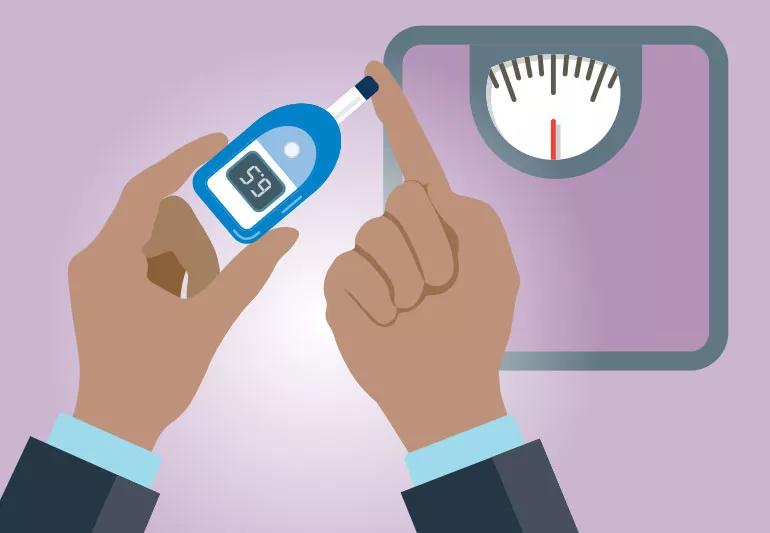It’s important to look out for early signs

Image content: This image is available to view online.
View image online (https://assets.clevelandclinic.org/transform/4dcf52e3-71e7-4b2d-8016-433692916fa9/diabetesWeightLoss-1312164416-770x533-1_jpg)
diabetes and weight loss
In many cases, we can afford to gain or lose a pound or two. It’s normal to indulge a little too much (especially around the holidays) and then work to get in some extra exercise time in our schedules. It’s also normal to lose a couple of pounds when battling an illness; once we feel better, we can start eating normally again and regain the weight.
Advertisement
Cleveland Clinic is a non-profit academic medical center. Advertising on our site helps support our mission. We do not endorse non-Cleveland Clinic products or services. Policy
One aspect of weight that’s not normal, however, is if you’re experiencing a major drop in pounds without any major diet or exercise changes. If this severe and unexpected weight loss is taking place, talk to your healthcare provider immediately.
While weight loss of just a pound or two isn’t a reason for concern, unexplained weight loss of 10 pounds or more may mean something is wrong and that your body is trying to tell you something. Ultimately, this dramatic weight loss could be an early sign of diabetes.
“This weight loss can occur relatively quickly — over a few weeks to a couple of months,” says registered nurse Sue Cotey, RN, CDCES.
Read on to find out why diabetes causes weight loss and what to do.
Insulin is a hormone that allows your body to use glucose (sugar) for energy.
If you have Type 2 diabetes, your body doesn’t use insulin effectively and can’t transport the glucose to your cells. Instead, it builds up in your blood.
“When the glucose doesn’t arrive in your cells, your body thinks it’s starving and finds a way to compensate. It creates energy by burning fat and muscle at a rapid pace. This causes unexplained weight loss,” explains Cotey.
Your kidneys also begin working overtime to eliminate the excess sugars in your blood. This uses additional energy and can cause damage to your kidneys.
Advertisement
Type 1 diabetes has a similar pattern, but instead of being unable to use insulin, your body stops producing it altogether.
Unexplained weight loss can occur in people who have Type 2 diabetes, but it’s more commonly found in people with Type 1. Parents are often the first to notice unusual weight loss in a child with Type 1 diabetes.
Weight loss from diabetes is not usually a standalone symptom. It’s typically accompanied by other signs, including:
If you’re experiencing weight loss and are uncertain about how to gain the weight back, consult with your physician. You don’t want to start eating unhealthy fats just to put the pounds back on, as that can lead to a worsened case of diabetes.
Instead, your doctor may suggest supplemental insulin treatments or other medications to make sure your blood sugar normalizes.
“It’s important to remember that unexplained weight loss isn’t normal,” says Cotey.
It’s not only a sign of diabetes, but may also point to other issues such as cancer or gastrointestinal tract, metabolism or thyroid issues. If you’re dropping weight and don’t know why, see your healthcare provider as soon as possible.
Advertisement

Sign up for our Health Essentials emails for expert guidance on nutrition, fitness, sleep, skin care and more.
Learn more about our editorial process.
Advertisement
Losing belly fat can reduce your risk for chronic health conditions — try focusing on a diet high in lean protein, exercising regularly, reducing stress and getting quality ZZZs
If you have low B12 or a true deficiency, these shots can work wonders
Actively choose healthy habits not only when it comes to food and nutrition, but also physical activity and your mental health
Resolve to move a little more, drink a little less, eat a little healthier, sleep a little better and destress a lot
There’s no evidence to prove this supplement can help with weight loss, and it may come with risks
Trying fad diets and skipping meals won’t do you any favors
Finding the causes of weight loss is key to treatment
Having obesity brings long-term health risks no matter your fitness level
Type 2 diabetes isn’t inevitable with these dietary changes
Applying a hot or cold compress can help with pain
Pump up your iron intake with foods like tuna, tofu and turkey